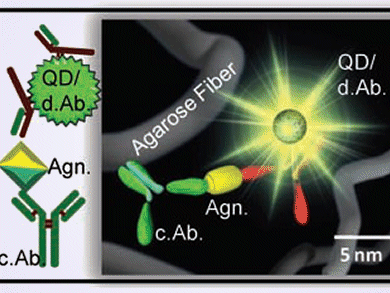Microsponges derived from seaweed may help diagnose heart disease, cancers, HIV, and other diseases quickly and at far lower cost than current clinical methods, report John McDevitt, Rice University, Houston, USA, and colleagues.
The programmable bio-nano-chips they have developed, consist of microfluidic channels that direct biomarkers in blood, saliva or other fluids, to mircosponges. The microsponges are 280 μm beads of agarose, from seaweed. The beads were shown to be an efficient and selective protein-capture medium suitable for the analysis of complex fluid samples. The sponge-like quality allowed a lot of fluid to be processed quickly (<15 min), while the large surface area could be used to generate optical signals 1,000 times greater than conventional devices.
With the carcinoembryonic antigens and Interleukin-1 beta proteins biomarkers, the beads showed near-total efficiency (99.5 %) in the detection of bead-bound biomarkers.
- Location of Biomarkers and Reagents within Agarose Beads of a Programmable Nano-bio-chip
J. V. Jokerst, J. Chou, J. P. Camp, J. Wong, A. Lennart et al.,
Small 2011.
DOI: 10.1002/smll.201002089



